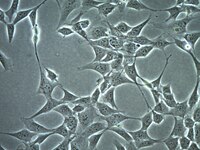SCC129 Sigma-AldrichHT-22 Mouse Hippocampal Neuronal Cell Line
HT-22 mouse neuronal cell line is a valuable cell model for studies of glutamate-induced toxicity in neuronal cells.
More>> HT-22 mouse neuronal cell line is a valuable cell model for studies of glutamate-induced toxicity in neuronal cells. Less<<Recommended Products
Overview
| Replacement Information |
|---|
Key Spec Table
| Key Applications |
|---|
| Neurotoxicity, Cell Based Assays |
| References |
|---|
| Product Information | |
|---|---|
| Quality Level | MQ100 |
| Biological Information | |
|---|---|
| Cell Line Type |
|
| Physicochemical Information |
|---|
| Dimensions |
|---|
| Materials Information |
|---|
| Toxicological Information |
|---|
| Safety Information according to GHS |
|---|
| Safety Information |
|---|
| Product Usage Statements | |
|---|---|
| Quality Assurance | • Each vial contains ≥ 1X106 viable cells. • Cells are tested negative for infectious diseases by a Mouse Essential CLEAR panel by Charles River Animal Diagnostic Services. • Cells are verified to be of mouse origin and negative for inter-species contamination from rat, chinese hamster, Golden Syrian hamster, human and non-human primate (NHP) as assessed by a Contamination Clear panel by Charles River Animal Diagnostic Services. • Cells are negative for mycoplasma contamination. |
| Usage Statement |
|
| Packaging Information | |
|---|---|
| Material Size | ≥1X10⁶ cells/vial |
| Transport Information |
|---|
| Supplemental Information |
|---|
| Specifications |
|---|
| Global Trade Item Number | |
|---|---|
| Catalogue Number | GTIN |
| SCC129 | 04054839252594 |
Documentation
HT-22 Mouse Hippocampal Neuronal Cell Line SDS
| Title |
|---|
Data Sheet
| Title |
|---|
| HT-22 Mouse Hippocampal Neuronal Cell Line |








